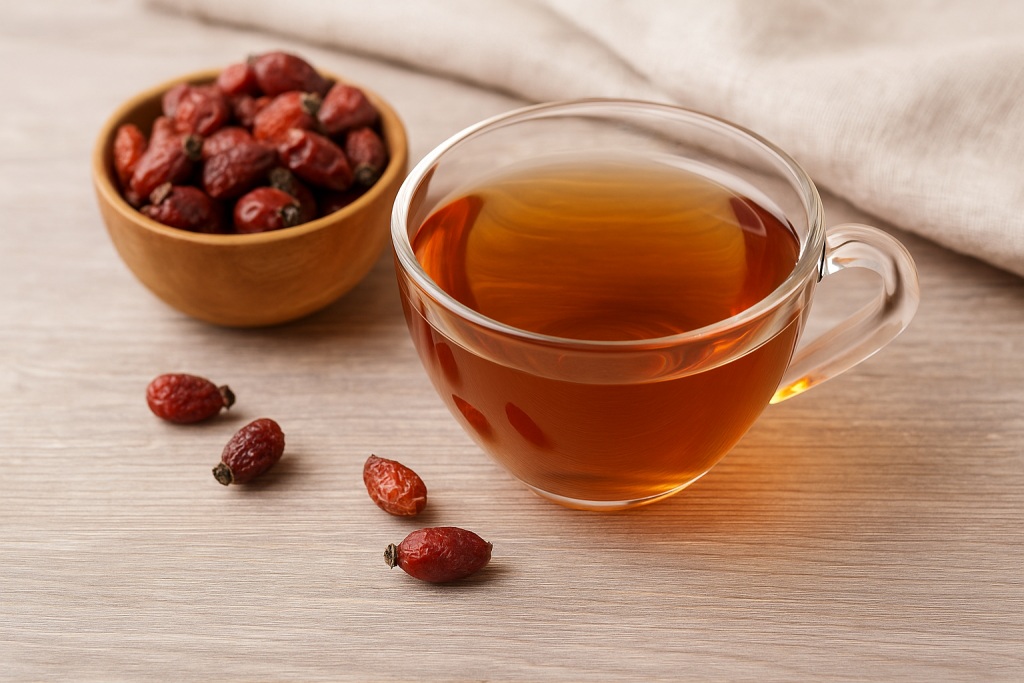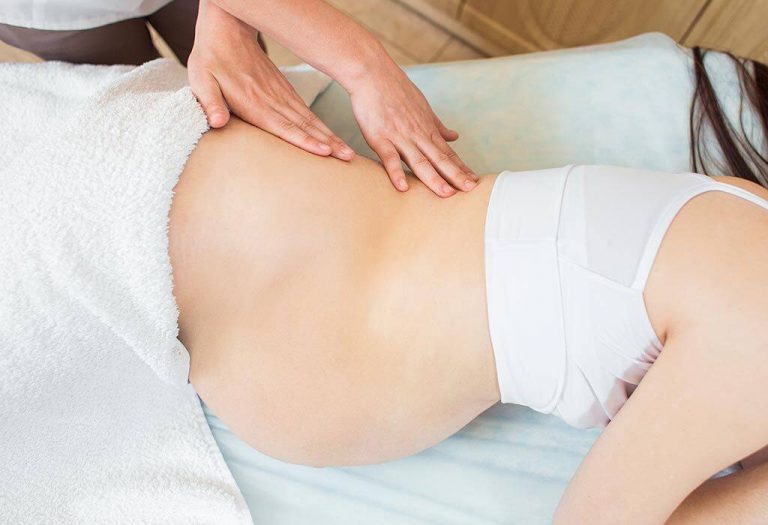Rose Hip Oil in Pregnancy – Benefits and Side Effects

- What Is Rose Hip?
- Nutritional Value of Rose Hip
- Is Rosehip Safe During Pregnancy?
- How Useful Is Rose Hip?
- How Much Rose Hip Should You Take in Pregnancy?
- Side Effects of Rose Hip for Pregnant Women
- How to Include Rose Hip in Your Routine?
- Benefits of Rose Hip Oil in Pregnancy
- When to Avoid Rose Hip?
- Rose Hip Tea Recipe You Can Try at Home
- FAQs
During pregnancy, several women turn to natural remedies to support their health and their babies, and rosehip is one such ingredient that is widely gaining attention. Known for its rich vitamin C content and antioxidant properties, rosehip can be found in teas, oils, and supplements. However, when it comes to the relationship of rosehip and pregnancy, it’s essential to understand both its potential benefits and possible side effects. Whether you’re considering rosehip tea or oil for pregnancy, understanding how it may affect your body and baby can help you make informed, safe choices. Before we know about the uses and effects of the use of Rose hip in pregnancy, let’s get a round-up on Rose hip, first.
What Is Rose Hip?
Rose hip is a medicinal, wild plant known for several therapeutic benefits. The round portion under the petals of the rose flower contains rose seeds, and these are called rose hips. Some other names of this fruit are Dog Rose Fruit, Rose Hep, Rose Haw, Hip Berries, Hip Fruit, Brier Hop, and Hop Fruit. Rose hips are berry-sized, little reddish balls of seeds that are found on the tips of the rose stems. Roses, crab apples and apples are all from the same family, which is why rose hips closely resemble crab apples. They are a rich source of Vitamin C. Dried rose hips and seeds are used to make medicines to treat various ailments experienced by people. The common ailments that rosehip medicines can treat are stomach ailments, osteoarthritis, and gastric inflammation.
Nutritional Value of Rose Hip
Let’s take a look at the nutritional value of rose hip below.
1. Vitamin A
Rose hips are rich in beta-carotene, a precursor to vitamin A. This nutrient is crucial for maintaining optimal eyesight and promoting healthy skin.
2. Vitamin E
Rose hips provide a notable supply of vitamin E, an antioxidant that safeguards the body against harm from free radicals, preventing potential damage.
3. Vitamin K
Rose hips contain modest quantities of vitamin K, which is vital for both blood clotting processes and maintaining strong bones.
4. Vitamin B
Rose hips serve as a valuable source of B vitamins like thiamine, riboflavin, and niacin. These nutrients play essential roles in energy metabolism, nerve function, and the health of your skin.
5. Minerals
Rose hips are a beneficial reservoir of minerals, such as iron, calcium, and potassium. Iron is vital for robust blood health, while calcium and potassium are pivotal for bone strength and muscle functionality.
6. Fibre
Rose hips provide a substantial source of dietary fibre, which is essential for maintaining regular bowel movements and promoting overall digestive health.
Is Rosehip Safe During Pregnancy?
Rosehip is an excellent source of vitamins. However, there is insufficient information on the effects of rose hip tea when consumed during pregnancy or breastfeeding. There is also insufficient research available on how rosehip affects the developing foetus (1). Thus, it is recommended that you consult with your obstetrician before taking it, as the required amount may vary from person to person. Women often wonder if they can use rosehip oil during pregnancy. Rose hip oil is loaded with vitamins A, C, E and fatty acids. These fatty acids provide anti-inflammatory benefits and can improve signs of ageing, pigmentation and moisturise the skin (2).
Topical use of rosehip oil is believed to work wonders in healing stretch marks and moisturising the skin. However, due to a lack of scientific evidence, we suggest consulting your doctor before using rose hip oil during pregnancy.
How Useful Is Rose Hip?
Rosehip may help in the following ways during pregnancy:
1. Helps in the Absorption of Iron and Calcium
Eating rosehip fruit is extremely beneficial as Vitamin C present in it may help in the absorption of iron in the body.
2. Helps in the Production of Collagen
The Vitamin C present in rosehip also helps in producing collagen and boosts the immune system.
3. Boosts Immunity
Rosehip is also rich in manganese, selenium, Vitamin B complex, potassium, magnesium and Vitamin E. Its tea can help boost immunity and fight off flu and cold.
4. Astringent Properties
These properties present in rosehip can help with chronic diseases of the kidney and poor control of the bladder.
5. Cures Constipation
The pectin and acids in the rosehip fruit can act as a mild laxative that helps to soften stool and make bowel movements easier, treating constipation.
6. Repairs Tissue
Vitamin C found in rosehip can be very helpful when it comes to repairing any wounds or tissues.
7. Natural Source of Folate
Rose hips contain folate, a vitamin B essential for fetal development. Adequate folate intake helps prevent neural tube defects in the developing baby. However, there’s no evidence of rose hip on the development of foetus’ growth and development.
8. Anti-inflammatory Properties
Rosehips are known for their high galactolipid content, which has been shown to possess anti-inflammatory properties. The anti-inflammatory properties of rosehip powder are known to provide clinical benefits in conditions such as osteoarthritis, rheumatoid arthritis and inflammatory bowel disease (3).
9. Aids Digestion
Rose hips are an amazing source of dietary fibre that prevents constipation, a common issue during pregnancy. This promotes regular bowel movements and supports overall digestive health.

How Much Rose Hip Should You Take in Pregnancy?
During pregnancy, it’s advised to be cautious about consuming excessive amounts of rose hips due to their high vitamin C content. This can potentially elevate the risk of kidney stones and other related complications. Due to a lack of scientific evidence on the effect of rose hip in pregnant women, it is advised to seek guidance from a healthcare professional or a certified nutritionist for precise dosage recommendations tailored to your individual needs (4).
Side Effects of Rose Hip for Pregnant Women
Rosehip can have some unpleasant, though not deadly, side effects. These can happen regardless of whether or not you are pregnant. General side effects of the use of rose hip are mentioned below (5):
These may also surface as side effects of rosehip during pregnancy.

How to Include Rose Hip in Your Routine?
Here are ten ways to include rose hip in your pregnancy diet:
1. Rose Hip Oil
Rose hip oil is rich in vitamins A and E, as well as essential fatty acids such as omega-3 and omega-6 fatty acids. There is a lack of research on the impact of consuming rose hip during pregnancy, but it is generally regarded as safe to use as an oil during this period. Rose hip oil fights hyperpigmentation, reduces dark spots and stretch marks, and soothes dry and itchy skin (2).
2. Rose Hip Tea
Brew dried rose hips to make a soothing herbal tea. It’s a simple and effective way to incorporate this nutritious ingredient into your daily routine.
3. Smoothie Booster
Add a teaspoon of rose hip powder or a small amount of dried rose hips to your pregnancy smoothies for an extra boost of vitamins and antioxidants.
4. Infused Water
Add sliced or dried rose hips to your water for a refreshing and subtly flavoured drink that also provides health benefits.
Benefits of Rose Hip Oil in Pregnancy
Let’s take a look at the benefits of using rose hip while pregnant.
1. Reduces Stretch Marks
You can use rosehip oil pregnancy for stretch marks during pregnancy as it is rich in essential fatty acids such as omega 3 and 6 and Vitamin C, which is great for healing scars. These are easily absorbed by the skin and aid in discolouration as well as moisturising the skin.
2. Promotes Wound Healing
The oil’s high content of antioxidants and essential fatty acids can support the skin’s natural healing process, aiding in the recovery of minor skin injuries or abrasions.
3. Reduces Hyperpigmentation
Rose hip oil may assist in evening out skin tone and reducing hyperpigmentation, a benefit particularly relevant for pregnant individuals experiencing skin discolouration.
When to Avoid Rose Hip?
Rosehip should be avoided by the following women in the following conditions:
- If you have hemochromatosis, a condition where the body retains too much iron.
- If you have sideroblastic anaemia, the bone marrow is unable to produce the normal amount of red blood cells.
- If you are affected by thalassemia, a genetically inherited condition where the red blood cells are unable to produce enough haemoglobin.
- If you have kidney stones.
- If you have sickle cell disease. Rosehip can make the blood more acidic due to Vitamin C, so it is best avoided in this condition.
- If you take Coumadin (warfarin).
- If you have glucose-6-phosphate dehydrogenase deficiency, the vitamin content can complicate the condition.
Rose Hip Tea Recipe You Can Try at Home
Though rosehip tea is said to have numerous benefits for pregnant women, there are very few studies showing the effects that it has on the baby. If you are interested in drinking rosehip tea, consult with your doctor first, and if you have permission, you can try the following methods that are easily prepared at home:
1. Rose Hip Tea From Fresh Rose Hips
If you have managed to get your hands on the fresh fruit, here is how to prepare the tea.
Ingredients
- Fresh Rosehips
- Water
How To Make
- Wash and dry rose hips and remove the top and the tail of each of them.
- After cutting the fruits in half, remove all the seeds from the inside.
- Boil some water.
- Place the rose hips inside a warm teapot.
- Once the water has reached a boil, pour it over the rose hips.
- Place the teapot lid to cover the teapot, allowing the rose hips to seep for about ten minutes.
- Use a strainer while pouring yourself a cup of freshly brewed, healthy rosehip tea and drink.

2. Rose Hip Tea From Dried Rose Hips
If you have dried rose hips, here is how you can prepare the tea.
Ingredients
- Four tablespoons of dried rosehips
- Four cups of water
How To Make
- Put both ingredients in a saucepan.
- Bring it to a boil.
- Once the tea starts boiling, lower the heat to a simmer.
- After five minutes, switch off the flame, strain the tea, and enjoy.

Image Credit : AI Generated Image
Despite the health benefits of rosehip, it is recommended that this fruit be consumed only after consulting a doctor if you have any intention of taking rose hips for pregnancy. Consuming rose hip in small amounts (such as eating the fruit or drinking tea) every now and then is all right, but it should not be taken to treat any type of medical condition unless you have consulted with your doctor and have had the approval to do so.
FAQs
1. Is It Safe to Take Rose Hips Supplements When Pregnant?
While taking rose hips supplements in recommended amounts is generally considered safe during pregnancy, it’s crucial to seek advice from your healthcare provider before incorporating any supplements into your routine.
2. Can Pregnant Women Drink Rose Hip and Hibiscus Tea?
Rosehip and hibiscus tea during pregnancy is not recommended for pregnant women due to potential risks and side effects.
3. Can You Have Rose Hip Syrup, Jam or Jelly When Pregnant?
Yes, you can consume rose hip syrup, jam or jelly during pregnancy.
4. Does Rose Hip Have Any Influence on Hormonal Balance in Pregnancy?
Rose hip, abundant in vitamin C, can potentially heighten estrogen absorption, carrying the risk of unfavourable effects for both mother and child. Research indicates elevated maternal estrogen levels could result in low birth weight, premature delivery, thyroid issues, autism, and various health disorders. It’s imperative to consult your healthcare provider before adding rose hip to your pregnancy diet.
The amount needed to treat any condition will vary according to each person’s individual case. As with everything, moderation is important so as not to cause any other problems. As there have been no studies conducted on how rose hip affects the foetus, most doctors will recommend that you do not take rose hips during pregnancy unless you have a particular need for them.
Also Read:
Eating Peaches while Pregnant
Caffeine Use during Pregnancy
Consuming Apricots during Pregnancy
List of Best Fruits to Eat during Pregnancy




































